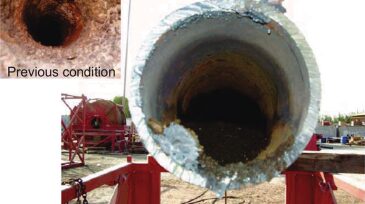Oilfield chemistry
A new tubing-conveyed tool combines wellbore cleanout with multi-tracer deployment for production diagnostics and reservoir monitoring.
This paper describes a decision-support system that integrates field data, system specifications, and simulation tools to quantify system performance, forecast operational challenges, and evaluate the effect of system modifications in water management.
This paper demonstrates that high-purity salts of calcium, magnesium, strontium, sodium, and lithium can be recovered from produced-water brine using a chemical-reaction pathway followed by vacuum-driven crystallization and a lithium-extraction process.
-
The gas-producing carbonate zones of the Ghawar field in eastern Saudi Arabia have been affected by extensive iron sulfide (FeS) scale deposition, reducing overall gas production and increasing risks during well interventions.
-
This paper describes various sulfide inhibitor-testing techniques that have been applied to candidate products for the management of zinc sulfide (ZnS) and lead sulfide (PbS) in a gas/condensate field with a known relatively severe ZnS/PbS scaling problem.
-
Critical to success is the accurate testing in the laboratory that best approximates field conditions.
-
Ferrous sulfide (FeS) precipitation increases during shale-gas and -oil production because of increased biologically and thermally induced sulfide production. Although FeS scale is abundant, little is understood about its precipitation and inhibition properties.
-
Mixed carbonate-/sulfide-scale problems have been reported when water is produced from carbonate reservoirs. This study presents interactions of lead sulfide and zinc sulfide coprecipitating with calcite.
-
The challenges for operators in the Eagle Ford have been enormous, which can push chemical management to the back burner. But there is a price to be paid down the road. Operators have recently become more mindful of implementing metric-driven chemical management programs.
-
The growing amount of heavy crude processed worldwide has created additional separation challenges, leading some operators to turn to alternative technologies. In some cases, electrocoalescence has been an effective tool to separate oil from water.
-
This is the fifth article in a series covering water management in hydraulic fracturing in unconventional resources. The focus of this article is biological control. Additives to improve fracturing conditions can have negative effects on water treatment.
-
A wide range of corrosive elements and compounds from a variety of crudes has led to a renewed industry focus on corrosion and the effects it has on pipelines and vessels.
-
A relatively small concentration of a defoamer can have a significant impact on the dynamics of multiphase flow within a pipe, but the effect is generally temporary.













